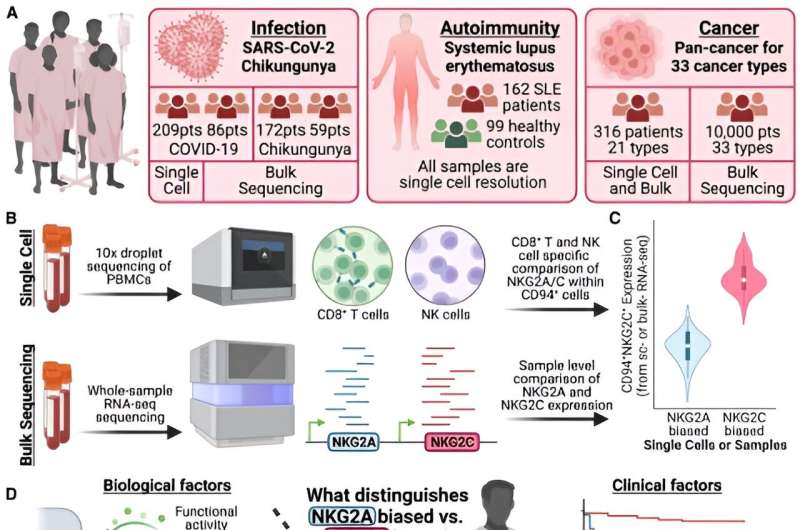This article has been reviewed according to Science X's editorial process and policies. Editors have highlighted the following attributes while ensuring the content's credibility:
fact-checked
proofread
Common immune response is found to be protective across many diseases

Combined, infection, autoimmunity and cancer account for 4 out of every 10 deaths worldwide, and represent major global health challenges. In a paper in the journal Cell Reports, Institute for Systems Biology (ISB) researchers highlight a novel discovery of how the human immune system works in common ways across diseases, and offer promising avenues for exploring multi-disease therapeutic strategies.
Many therapies, while effective for one class of disease, may aggravate others. Cancer treatments like immune checkpoint blockade, for example, can trigger autoimmunity. Similarly, drugs targeting autoimmune diseases may leave patients more susceptible to infections and cancer.
"Understanding shared human immune system characteristics across these disease contexts is crucial for identifying potential therapeutic strategies that could treat a patient's primary ailment while not triggering secondary conditions," said ISB President Dr. Jim Heath, corresponding author of the paper.
To address these challenges, ISB researchers have identified two immune cell receptors—NKG2A and NKG2C—as factors influencing immune responses across diseases. These receptors, which are not seen together on the same cells, have gained significant interest in the immunology community for their ability to regulate the function of T cells and natural killer cells.
The research team examined deep clinical and biological data of 526 patients with infection, 162 patients with lupus, and 11,180 patients with cancer, considering whether the patients' T cells or natural killer immune cells could be classified as NKG2A-biased or NKG2C-biased.
Through a comprehensive analysis, they found that an NKG2A-dominant immune response correlates with decreased disease severity and mortality, and lower prevalence of post-acute chronic conditions across all disease contexts.
"Patients with more NKG2A activity showed decreased inflammation and increased survival rates across different disease contexts, including viral infections, autoimmune diseases like lupus, and various cancer types," said Daniel Chen, first author of the paper.
The study also identified distinct immune cell profiles associated with NKG2A and NKG2C biases, which could lead to potential therapeutic targets for modifying immune responses across diseases. It also suggests that treating NKG2A as a drug target for cancer immunotherapy, which is an idea that has been pursued in oncology clinical trials, would likely not be successful. The study's findings are, in fact, consistent with what has been found in those trials.
"We plan future studies to delve deeper into the biological mechanisms underlying these immune biases, which we believe will lead to developing more targeted and effective treatments," Heath said.
More information: Daniel G. Chen et al, Integrative systems biology reveals NKG2A-biased immune responses correlate with protection in infectious disease, autoimmune disease, and cancer, Cell Reports (2024). DOI: 10.1016/j.celrep.2024.113872



















